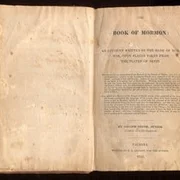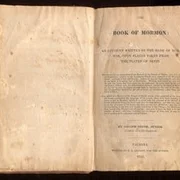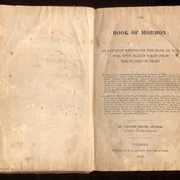The Book Of Alma (Chap. 30) de Joseph Smith
The Book Of Mormon: An Account Written By The Hand Of Mormon Upon Plates Taken From The Plates Of Nephi
28 de julio de 2024
Letra de The Book Of Alma (Chap. 30)
Alma 30:1
Behold, now it came to pass that after the people of Ammon
were established in the land of Jershon, yea, and also after the
Lamanites were driven out of the land, and their dead were buried
by the people of the land—
Alma 30:2
Now their dead were not numbered because of the greatness of
their numbers; neither were the dead of the Nephites
numbered—but it came to pass after they had buried their dead,
and also after the days of fasting, and mourning, and prayer,
(and it was in the sixteenth year of the reign of the judges over
the people of Nephi) there began to be continual peace throughout
all the land.
Alma 30:3
Yea, and the people did observe to keep the commandments of
the Lord; and they were strict in observing the ordinances of
God, according to the law of Moses; for they were taught to keep
the law of Moses until it should be fulfilled.
Alma 30:4
And thus the people did have no disturbance in all the
sixteenth year of the reign of the judges over the people of
Nephi.
Alma 30:5
And it came to pass that in the commencement of the
seventeenth year of the reign of the judges, there was continual
peace.
Alma 30:6
But it came to pass in the latter end of the seventeenth year,
there came a man into the land of Zarahemla, and he was
Anti-Christ, for he began to preach unto the people against the
prophecies which had been spoken by the prophets, concerning the
coming of Christ.
Alma 30:7
Now there was no law against a man's belief; for it was
strictly contrary to the commands of God that there should be a
law which should bring men on to unequal grounds.
Alma 30:8
For thus saith the scripture: Choose ye this day, whom ye will
serve.
Alma 30:9
Now if a man desired to serve God, it was his privilege; or
rather, if he believed in God it was his privilege to serve him;
but if he did not believe in him there was no law to punish him.
Alma 30:10
But if he murdered he was punished unto death; and if he
robbed he was also punished; and if he stole he was also
punished; and if he committed adultery he was also punished; yea,
for all this wickedness they were punished.
Alma 30:11
For there was a law that men should be judged according to
their crimes. Nevertheless, there was no law against a man's
belief; therefore, a man was punished only for the crimes which
he had done; therefore all men were on equal grounds.
Alma 30:12
And this Anti-Christ, whose name was Korihor, (and the law
could have no hold upon him) began to preach unto the people that
there should be no Christ. And after this manner did he preach,
saying:
Alma 30:13
O ye that are bound down under a foolish and a vain hope, why
do ye yoke yourselves with such foolish things? Why do ye look
for a Christ? For no man can know of anything which is to come.
Alma 30:14
Behold, these things which ye call prophecies, which ye say
are handed down by holy prophets, behold, they are foolish
traditions of your fathers.
Alma 30:15
How do ye know of their surety? Behold, ye cannot know of
things which ye do not see; therefore ye cannot know that there
shall be a Christ.
Alma 30:16
Ye look forward and say that ye see a remission of your sins.
But behold, it is the effect of a frenzied mind; and this
derangement of your minds comes because of the traditions of your
fathers, which lead you away into a belief of things which are
not so.
Alma 30:17
And many more such things did he say unto them, telling them
that there could be no atonement made for the sins of men, but
every man fared in this life according to the management of the
creature; therefore every man prospered according to his genius,
and that every man conquered according to his strength; and
whatsoever a man did was no crime.
Alma 30:18
And thus he did preach unto them, leading away the hearts of
many, causing them to lift up their heads in their wickedness,
yea, leading away many women, and also men, to commit
whoredoms—telling them that when a man was dead, that was the
end thereof.
Alma 30:19
Now this man went over to the land of Jershon also, to preach
these things among the people of Ammon, who were once the people
of the Lamanites.
Alma 30:20
But behold they were more wise than many of the Nephites; for
they took him, and bound him, and carried him before Ammon, who
was a high priest over that people.
Alma 30:21
And it came to pass that he caused that he should be carried
out of the land. And he came over into the land of Gideon, and
began to preach unto them also; and here he did not have much
success, for he was taken and bound and carried before the high
priest, and also the chief judge over the land.
Alma 30:22
And it came to pass that the high priest said unto him: Why
do ye go about perverting the ways of the Lord? Why do ye teach
this people that there shall be no Christ, to interrupt their
rejoicings? Why do ye speak against all the prophecies of the
holy prophets?
Alma 30:23
Now the high priest's name was Giddonah. And Korihor said
unto him: Because I do not teach the foolish traditions of your
fathers, and because I do not teach this people to bind
themselves down under the foolish ordinances and performances
which are laid down by ancient priests, to usurp power and
authority over them, to keep them in ignorance, that they may not
lift up their heads, but be brought down according to thy words.
Alma 30:24
Ye say that this people is a free people. Behold, I say they
are in bondage. Ye say that those ancient prophecies are true.
Behold, I say that ye do not know that they are true.
Alma 30:25
Ye say that this people is a guilty and a fallen people,
because of the transgression of a parent. Behold, I say that a
child is not guilty because of its parents.
Alma 30:26
And ye also say that Christ shall come. But behold, I say
that ye do not know that there shall be a Christ. And ye say
also that he shall be slain for the sins of the world—
Alma 30:27
And thus ye lead away this people after the foolish
traditions of your fathers, and according to your own desires;
and ye keep them down, even as it were in bondage, that ye may
glut yourselves with the labors of their hands, that they durst
not look up with boldness, and that they durst not enjoy their
rights and privileges.
Alma 30:28
Yea, they durst not make use of that which is their own lest
they should offend their priests, who do yoke them according to
their desires, and have brought them to believe, by their
traditions and their dreams and their whims and their visions and
their pretended mysteries, that they should, if they did not do
according to their words, offend some unknown being, who they say
is God—a being who never has been seen or known, who never was
nor ever will be.
Alma 30:29
Now when the high priest and the chief judge saw the hardness
of his heart, yea, when they saw that he would revile even
against God, they would not make any reply to his words; but they
caused that he should be bound; and they delivered him up into
the hands of the officers, and sent him to the land of Zarahemla,
that he might be brought before Alma, and the chief judge who was
governor over all the land.
Alma 30:30
And it came to pass that when he was brought before Alma and
the chief judge, he did go on in the same manner as he did in the
land of Gideon; yea, he went on to blaspheme.
Alma 30:31
And he did rise up in great swelling words before Alma, and
did revile against the priests and teachers, accusing them of
leading away the people after the silly traditions of their
fathers, for the sake of glutting on the labors of the people.
Alma 30:32
Now Alma said unto him: Thou knowest that we do not glut
ourselves upon the labors of this people; for behold I have
labored even from the commencement of the reign of the judges
until now, with mine own hands for my support, notwithstanding my
many travels round about the land to declare the word of God unto
my people.
Alma 30:33
And notwithstanding the many labors which I have performed in
the church, I have never received so much as even one senine for
my labor; neither has any of my brethren, save it were in the
judgment-seat; and then we have received only according to law
for our time.
Alma 30:34
And now, if we do not receive anything for our labors in the
church, what doth it profit us to labor in the church save it
were to declare the truth, that we may have rejoicings in the joy
of our brethren?
Alma 30:35
Then why sayest thou that we preach unto this people to get
gain, when thou, of thyself, knowest that we receive no gain?
And now, believest thou that we deceive this people, that causes
such joy in their hearts?
Alma 30:36
And Korihor answered him, Yea.
Alma 30:37
And then Alma said unto him: Believest thou that there is a
God?
Alma 30:38
And he answered, Nay.
Alma 30:39
Now Alma said unto him: Will ye deny again that there is a
God, and also deny the Christ? For behold, I say unto you, I
know there is a God, and also that Christ shall come.
Alma 30:40
And now what evidence have ye that there is no God, or that
Christ cometh not? I say unto you that ye have none, save it be
your word only.
Alma 30:41
But, behold, I have all things as a testimony that these
things are true; and ye also have all things as a testimony unto
you that they are true; and will ye deny them? Believest thou
that these things are true?
Alma 30:42
Behold, I know that thou believest, but thou art possessed
with a lying spirit, and ye have put off the Spirit of God that
it may have no place in you; but the devil has power over you,
and he doth carry you about, working devices that he may destroy
the children of God.
Alma 30:43
And now Korihor said unto Alma: If thou wilt show me a sign,
that I may be convinced that there is a God, yea, show unto me
that he hath power, and then will I be convinced of the truth of
thy words.
Alma 30:44
But Alma said unto him: Thou hast had signs enough; will ye
tempt your God? Will ye say, Show unto me a sign, when ye have
the testimony of all these thy brethren, and also all the holy
prophets? The scriptures are laid before thee, yea, and all
things denote there is a God; yea, even the earth, and all things
that are upon the face of it, yea, and its motion, yea, and also
all the planets which move in their regular form do witness that
there is a Supreme Creator.
Alma 30:45
And yet do ye go about, leading away the hearts of this
people, testifying unto them there is no God? And yet will ye
deny against all these witnesses? And he said: Yea, I will deny,
except ye shall show me a sign.
Alma 30:46
And now it came to pass that Alma said unto him: Behold, I am
grieved because of the hardness of your heart, yea, that ye will
still resist the spirit of the truth, that thy soul may be
destroyed.
Alma 30:47
But behold, it is better that thy soul should be lost than
that thou shouldst be the means of bringing many souls down to
destruction, by thy lying and by thy flattering words; therefore
if thou shalt deny again, behold God shall smite thee, that thou
shalt become dumb, that thou shalt never open thy mouth any more,
that thou shalt not deceive this people any more.
Alma 30:48
Now Korihor said unto him: I do not deny the existence of a
God, but I do not believe that there is a God; and I say also,
that ye do not know that there is a God; and except ye show me a
sign, I will not believe.
Alma 30:49
Now Alma said unto him: This will I give unto thee for a
sign, that thou shalt be struck dumb, according to my words; and
I say, that in the name of God, ye shall be struck dumb, that ye
shall no more have utterance.
Alma 30:50
Now when Alma had said these words, Korihor was struck dumb,
that he could not have utterance, according to the words of Alma.
Alma 30:51
And now when the chief judge saw this, he put forth his hand
and wrote unto Korihor, saying: Art thou convinced of the power
of God? In whom did ye desire that Alma should show forth his
sign? Would ye that he should afflict others, to show unto thee
a sign? Behold, he has showed unto you a sign; and now will ye
dispute more?
Alma 30:52
And Korihor put forth his hand and wrote, saying: I know that
I am dumb, for I cannot speak; and I know that nothing save it
were the power of God could bring this upon me; yea, and I always
knew that there was a God.
Alma 30:53
But behold, the devil hath deceived me; for he appeared unto
me in the form of an angel, and said unto me: Go and reclaim this
people, for they have all gone astray after an unknown God. And
he said unto me: There is no God; yea, and he taught me that
which I should say. And I have taught his words; and I taught
them because they were pleasing unto the carnal mind; and I
taught them, even until I had much success, insomuch that I
verily believed that they were true; and for this cause I
withstood the truth, even until I have brought this great curse
upon me.
Alma 30:54
Now when he had said this, he besought that Alma should pray
unto God, that the curse might be taken from him.
Alma 30:55
But Alma said unto him: If this curse should be taken from
thee thou wouldst again lead away the hearts of this people;
therefore, it shall be unto thee even as the Lord will.
Alma 30:56
And it came to pass that the curse was not taken off of
Korihor; but he was cast out, and went about from house to house
begging for his food.
Alma 30:57
Now the knowledge of what had happened unto Korihor was
immediately published throughout all the land; yea, the
proclamation was sent forth by the chief judge to all the people
in the land, declaring unto those who had believed in the words
of Korihor that they must speedily repent, lest the same
judgments would come unto them.
Alma 30:58
And it came to pass that they were all convinced of the
wickedness of Korihor; therefore they were all converted again
unto the Lord; and this put an end to the iniquity after the
manner of Korihor. And Korihor did go about from house to house,
begging food for his support.
Alma 30:59
And it came to pass that as he went forth among the people,
yea, among a people who had separated themselves from the
Nephites and called themselves Zoramites, being led by a man
whose name was Zoram—and as he went forth amongst them, behold,
he was run upon and trodden down, even until he was dead.
Alma 30:60
And thus we see the end of him who perverteth the ways of the
Lord; and thus we see that the devil will not support his
children at the last day, but doth speedily drag them down to
hell.
Traducción de The Book Of Alma (Chap. 30)
Letra traducida a Español
Alma 30:1
Y aconteció que después de que el pueblo de Amón
se estableció en la tierra de Jershon, sí, y también después de que los
lamanitas fueron expulsados de la tierra, y sus muertos fueron enterrados
por el pueblo de la tierra—
Alma 30:2
Los muertos no fueron contados por su gran número; tampoco se contaron los muertos de los nefitas,
pero aconteció que después de haber enterrado a sus muertos,
y también después de días de ayuno, duelo y oración,
(y fue en el décimo sexto año del reinado de los jueces sobre
el pueblo de Nefi) comenzó a haber paz continua en toda la tierra.
Alma 30:3
Sí, y el pueblo observaba cumplir los mandamientos del
Señor; y eran estrictos en observar las ordenanzas de
Dios, conforme a la ley de Moisés; porque les enseñaron a mantener
la ley de Moisés hasta que se cumpliera.
Alma 30:4
Y así el pueblo no tuvo disturbios en todo el décimo sexto año del reinado de los jueces sobre el pueblo de Nefi.
Alma 30:5
Y sucedió que al comenzar el décimo séptimo año del reinado de los jueces, hubo paz continua.
Alma 30:6
Pero ocurrió que hacia finales del décimo séptimo año,
vino un hombre a la tierra de Zarahemla, y era anti-Cristo,
porque comenzó a predicar al pueblo contra las profecías que habían sido dichas por los profetas, concernientes a la venida de Cristo.
Alma 30:7
Ahora bien, no había ninguna ley contra las creencias de un hombre;
porque era estrictamente contrario a los mandamientos de Dios que hubiese una ley que pusiera a los hombres en condiciones desiguales.
Alma 30:8
Porque así dice la escritura: Escoge hoy a quién servirás.
Alma 30:9
Ahora bien, si un hombre desea servir a Dios, es su privilegio;
o más bien, si él cree en Dios es su privilegio servirle;
pero si no cree en él no hay ley para castigarle.
Alma 30:10
Pero si comete asesinato será castigado con muerte; y si roba también será castigado; y si roba también será castigado; y si comete adulterio también será castigado; sí,
por toda esta maldad serán castigados.
Alma 30:11
Porque había una ley según la cual los hombres serían juzgados conforme a sus crímenes. No obstante, no había ninguna ley contra las creencias humanas;
por lo tanto, un hombre sólo era castigado por los crímenes cometidos;
de ahí que todos fueran tratados en igualdad.
Alma 30:12
Y este anti-Cristo, cuyo nombre era Corihor,
(y la ley no podía tener ningún dominio sobre él) comenzó a predicar al pueblo que no debería haber Cristo. Y así predicó,
diciendo:
Alma 30:13
Oh tú que estás atado bajo una esperanza vana e insensata,
por qué te cargas con tales tonterías? Por qué buscas un Cristo? Porque ningún hombre puede conocer nada acerca del futuro.
Alma 30:14
He aquí estas cosas que llamáis profecías, las cuales decís han sido transmitidas por santos profetas; he aquí son tradiciones vanas,
tradiciones foolish of your fathers.
Alma 30:15
Como puedes saber acerca dde su certeza? He aquí tú no puedes saber cosas cuya existencia no ves; por lo cual tú tampoco puedes saberque debe haber uCristo.
Alma
30 :16
Tú miras adelante y dices ver una remisión para tus pecados. Pero he aquí es efecto del frenesí mental,y este
trastorno
mental proviene porquehas seguido tradicionalmente tu cultura ancestral,
lo
cual te aleja hacia creer cosas equivocadas.
Alma
30 :17
Y muchas otras cosas similares dijo entre
0
0
Tendencias de esta semana
Datos no encontrados



